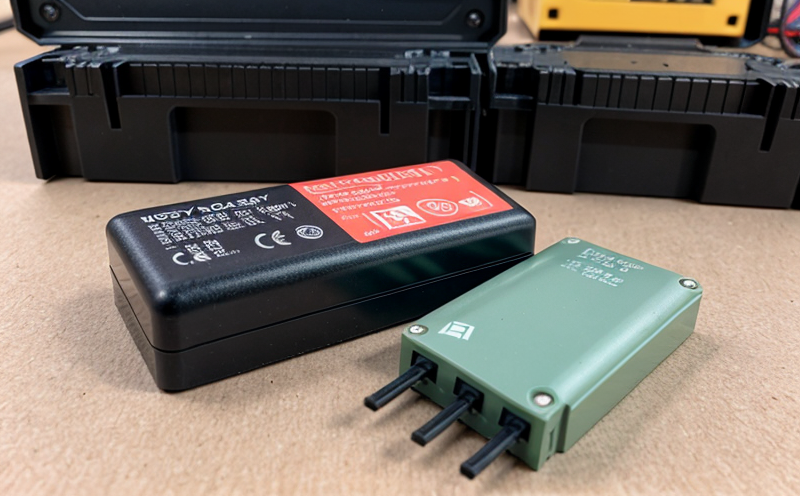UL 2271 Battery Modules for Light Electric Vehicle Applications Testing
The UL 2271 standard is a critical guideline for ensuring the safety and durability of battery modules used in light electric vehicle (LEV) applications. This standard addresses the unique challenges posed by high-capacity, rechargeable batteries that are integral to modern LEVs such as e-scooters, e-bikes, and other small electric vehicles.
UL 2271 focuses on several key areas: mechanical integrity, electrical safety, thermal management, and chemical stability. The standard covers not only the battery modules themselves but also the integration of these modules into the overall vehicle system. This holistic approach is essential for ensuring that both the battery module and its application in a LEV are safe under expected conditions.
The testing process involves rigorous procedures to simulate real-world scenarios, including extreme temperatures, high-pressure drops, overcharging, and short-circuiting. By adhering to these stringent tests, manufacturers can ensure their products meet or exceed safety standards set forth by UL 2271.
At Eurolab, we utilize state-of-the-art equipment designed specifically for this type of testing. Our experienced team performs these assessments meticulously, ensuring accurate results that reflect both current industry practices and future trends in electric vehicle technology.
The outcome of successful UL 2271 compliance is a safer product with enhanced reliability and performance. This certification can also open doors to new markets where stringent safety regulations are in place or where market demand for safe and reliable products is growing rapidly.
In summary, the UL 2271 standard plays an indispensable role in advancing the development of LEV technology by providing a robust framework for evaluating battery modules. By leveraging this standard, manufacturers can build confidence among consumers while meeting regulatory requirements worldwide.
Scope and Methodology
The UL 2271 testing protocol encompasses various aspects of the battery module's design, manufacturing process, and intended use. This includes:
- Electrical performance: Testing for voltage stability, current flow, and power output.
- Mechanical durability: Simulating impacts and vibrations to ensure structural integrity.
- Thermal management: Evaluating the battery's ability to maintain safe operating temperatures during various conditions.
- Chemical stability: Assessing the safety of electrolytes and other chemical components.
The testing process begins with careful preparation of the sample, which involves charging and discharging cycles followed by a series of stress tests. These may include temperature cycling between extreme cold and heat, exposure to humidity, and simulated operational conditions like overcharge or deep discharge scenarios.
Once the initial preparations are completed, rigorous mechanical testing follows. This includes drop tests from varying heights onto different surfaces as well as compression tests designed to mimic real-world stressors encountered during transportation and operation.
After completing all mechanical and electrical evaluations, thermal imaging is used to monitor heat generation patterns across the battery module throughout each test cycle. Finally, chemical analysis ensures that no hazardous substances are released into the environment under any tested condition.
The comprehensive nature of UL 2271 testing guarantees compliance with international safety standards while providing valuable insights into potential improvements for future iterations of the product.
Eurolab Advantages
At Eurolab, our commitment to excellence in battery module and pack testing is reflected in several key advantages:
- State-of-the-Art Equipment: Leveraging advanced instrumentation allows us to conduct precise and reliable tests.
- Experienced Professionals: Our team consists of highly trained engineers specializing in LEV technologies and UL standards.
- Comprehensive Reporting: Detailed reports provide actionable insights for continuous improvement.
- Industry Collaboration: We work closely with leading companies to stay ahead of technological advancements.
We understand that every client has unique needs, which is why we tailor our services to meet those specific requirements. Whether you're looking to validate existing designs or develop new prototypes, Eurolab offers the expertise and resources necessary for success.
Our focus on quality and safety ensures that your products not only comply with UL 2271 but also stand out in increasingly competitive markets. By choosing Eurolab as your partner, you're investing in a future where innovation meets reliability.
Competitive Advantage and Market Impact
The implementation of UL 2271 certification brings numerous benefits to manufacturers operating within the LEV industry. Not only does it enhance product safety, but it also contributes significantly to brand reputation and market positioning:
- Increased Consumer Confidence: Compliance with recognized international standards builds trust among consumers.
- Better Risk Management: Proactive identification of potential hazards minimizes liability risks.
- Enhanced Product Quality: Stringent testing ensures superior performance and longevity.
- Regulatory Readiness: Meeting these standards prepares your company for future regulatory changes or expansions into new regions.
- Premier Brand Image: Successfully passing UL 2271 tests can serve as a differentiator in an overcrowded market.
In today's fast-paced technological landscape, staying ahead of competitors requires not just cutting-edge technology but also unwavering commitment to quality and safety. By partnering with Eurolab for your UL 2271 testing needs, you ensure that your products are at the forefront of innovation while adhering strictly to global standards.





